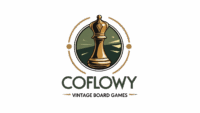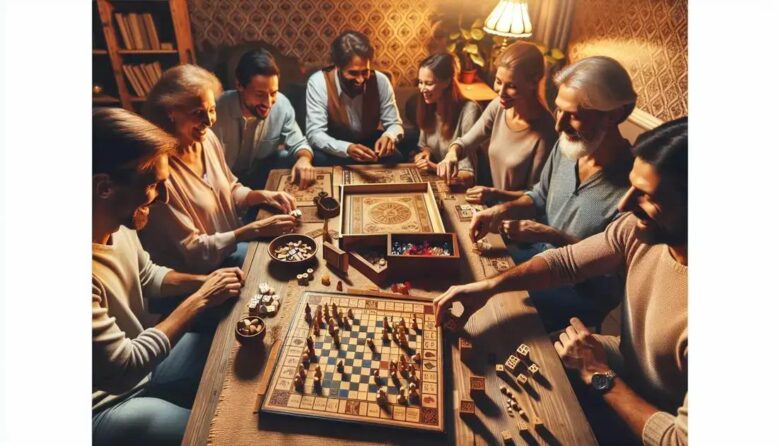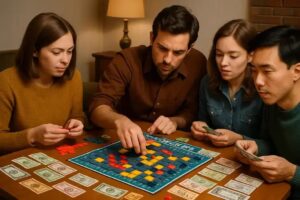A board game glossary for classic games defines key terms like meeple, turn order, scoring, and house rules that help players understand and enjoy vintage games more deeply.
If you’ve ever felt lost while playing old favorites, this board game glossary for classic games might be your best ally. Curious how knowing vintage terms can deepen your game nights? Let’s dive in and uncover gems that seasoned players cherish.
essential terms from classic board games
When diving into classic board games, understanding essential terms is crucial for enjoying the full experience. Terms like “meeple” describe the small player figures used in many games, especially in classics like Carcassonne. Knowing what “turn order” means helps you follow the game’s flow, ensuring each player acts at the right time.
Game phases refer to distinct parts of gameplay, such as setup, action, and scoring. For example, in Chess, recognizing the difference between the opening, middlegame, and endgame phases is vital to strategy.
Other terms like “token,” which can be a marker or resource, and “deck”, referring to a stack of cards, frequently appear in classic games such as Monopoly or Risk. Learning these words helps players communicate clearly and understand instructions better.
Sometimes, you may encounter “house rules”, which are player-made modifications to standard rules to tailor the game experience. Being aware of such terms ensures everyone is on the same page and can enjoy classic games with confidence.
understanding game mechanics in vintage games
Understanding game mechanics in vintage board games is essential to fully enjoy their challenges and strategies. These mechanics are the basic rules and methods that dictate how players interact with the game and each other.
Common mechanics include roll-and-move, where players advance pieces based on dice rolls, typical of classic games like Monopoly. Another important mechanic is resource management, where players must wisely use limited items, such as in Settlers of Catan, to build or gain advantages.
Area control is also popular, requiring players to compete for dominance over sections of the game board. This mechanic appears often in vintage war or strategy games. Additionally, set collection involves gathering specific items or cards to achieve points or goals, adding an element of planning and luck.
Understanding these mechanics helps players anticipate opponents’ moves and make better decisions. Recognizing how these systems work together allows for a deeper appreciation of vintage games’ design and replay value.
common phrases used by long-time players
Long-time players of classic board games often use specific common phrases that help streamline gameplay and build community. Terms like “house rules” refer to personalized variations of the official rules, often created to make the game more fun or balanced among familiar players.
“Taking a mulligan” is a phrase borrowed from card games, meaning to redraw or redo a turn or move when the initial action wasn’t favorable. This informal term often arises in friendly matches.
Another popular phrase is “table talk”, which means the discussion or negotiation happening among players during the game. It is an essential part of social strategy games where communication impacts outcomes.
Expressions like “housekeeping phase” describe moments in the game when players reset or prepare for the next round, such as cleaning up cards or rearranging game pieces. Understanding these phrases helps players feel more integrated and enhances the overall gaming experience.
how to interpret scoring and turns
Interpreting scoring and turns is key to mastering classic board games. Scoring systems vary widely, from simple point totals to complex calculations based on achievements or resource collections.
Many vintage games use a turn-based system where players take actions in a specific order. Understanding the turn order helps anticipate opponents’ moves and plan your strategy effectively.
Scoring might be cumulative, where points add up each round, or final, where only end-of-game totals matter. Pay attention to special bonuses or penalties noted in the rules, as they can change the game outcome significantly.
Scorekeeping methods often include tokens, cards, or paper records. It’s important to keep track accurately to avoid disputes. Some games have unique scoring phrases, like “victory points” or “penalty points,” which players should be familiar with to interpret results correctly.
By mastering how scoring and turns work, players gain better control of gameplay and improve their chances of winning.
strategies linked to classic game vocabulary
Mastering strategies linked to classic game vocabulary can greatly improve your gameplay. Terms like “blocking” refer to moves that prevent opponents from advancing, common in games like Chess and Checkers.
“Building” often means creating structures or accumulating resources, a key part of games such as Settlers of Catan. Recognizing this term helps players plan their turns to expand influence or gain advantages.
Understanding “trade” is essential in many vintage games. It involves exchanging cards, tokens, or resources with other players, adding a social and tactical layer to the game.
Another term, “bluffing,” comes from classic games involving hidden information, where players deceive others to gain an edge. Knowing how and when to bluff can be decisive.
Familiarity with these strategic terms allows players to communicate effectively and execute plans that increase their chances of victory.
tips for teaching classic game terms to newcomers
Teaching classic game terms to newcomers can be both fun and rewarding. Start by introducing basic vocabulary like “turn,” “token,” and “score,” which are common in most vintage games. Use examples during gameplay to show how these terms relate to actual moves.
Encourage questions and explain game mechanics clearly, breaking down complex terms into simple language. Visual aids such as cards or tokens labeled with terms can help learners remember key concepts.
Creating a glossary sheet with definitions can be a practical tool, especially for games with many specific terms. Using analogies or comparisons to familiar activities can also make the vocabulary stick.
Practice sessions focused on using the terms correctly during play can boost confidence. Finally, foster a welcoming atmosphere that values patience and fun, making it easier for newcomers to engage and learn effectively.
Wrapping Up Classic Board Game Vocabulary
Knowing the key terms and strategies of vintage board games can make your playing experience much more enjoyable and engaging. It helps you understand the rules better and connect with other players more easily.
Taking the time to learn and teach these classic game terms creates a fun and welcoming environment for both beginners and seasoned players. So, dive in, explore the board game glossary for classic games, and bring new life to your game nights!




